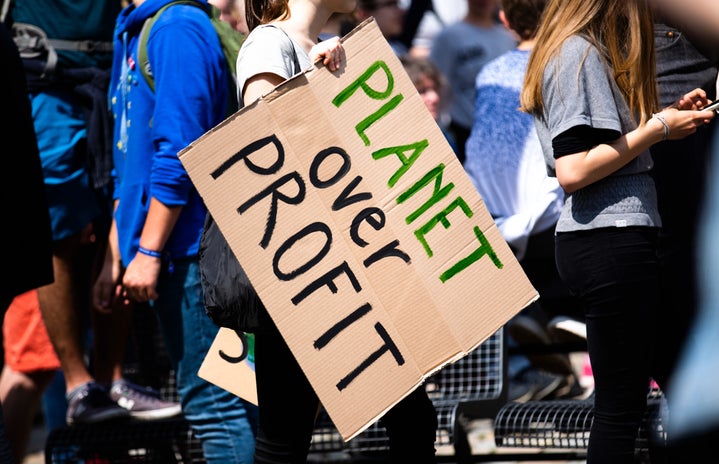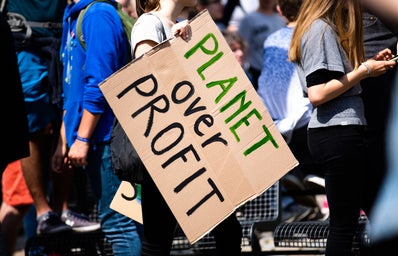If you are a Generation Z media culture participant, you have most likely been thrifting with your friends or owned metal straws. You’ve probably done both at the same time. A specific generation influences most of these social media trends, Gen Z. Some trends that have become popular include reusable water bottles, tote bags and reusable menstrual cups. These trends have two things in common: being sustainable and Gen Z.
Sustainability means “meeting our own needs without compromising the ability of future generations to meet their own needs,” McGill University said. “This is a relatively new idea that has emerged from environmental, economic, and societal movements.” The media has only contributed to the popularity of the concept.
Lena Khader, a 20-year-old University of North Carolina student, explains how important sustainability has become in her daily life.
“I make a lot of efforts to be sustainable, and most of them have to do with reducing waste and single-use plastics,” Khader said. “I use silicon bags, reusable kitchen towels, and beeswax wraps…I always make sure to bring my own reusable bags with me when I’m shopping…opting for glass or paper products and packaging when possible.”
Since the start of the climate change movements, the media has taken part in helping the environment in various ways. The “Skip the Straw, Save the Turtles” campaign went viral on social media and introduced paper and metal straws to people. Large businesses, like Starbucks, started to use biodegradable straws and create strawless lids. The eco-friendly trends created a persona on social media called the ‘VSCO girl’ that wore scrunchies, used reusable water bottles, metal straws and tote bags. The persona became popular and increased sales for specific brands, like Hydro Flask. Gen Zs are the ones leading these trends and are having the most outreach to higher and more powerful corporations, so it seems reasonable to say that Gen Zs are the leaders of the new eco-conscious wave spreading over society.
A Gen Z activist, Greta Thunberg, became the face of climate change at 15 years old when she joined a climate change protest outside parliament. Since then, Thunberg has inspired her generation to stand up to powerful corporations and use their power to influence those businesses on climate change. Thunberg has shown that Gen Z is not to be underestimated just because of their younger age.
Gen Z is the youngest of the generations that understand what scientists and news channels are constantly saying about the decline of Earth because of climate change. Gen Zs are also young and don’t want the Earth to end before they do, so Gen Z takes on the responsibility to save it. Seeing someone their age or younger, like Greta Thunberg, may inspire them or guilt them to also take action, but whatever is motivating them, it’s working.
Other generations are less focused on being environmentally conscious or sustainable and mock Gen Z’s efforts. According to a survey of US consumer attitudes towards sustainable shopping, 75% of Gen Zs thinks it’s more important to make sustainable purchases than buy brand names. This is significantly higher than Baby Boomers, Generation X, and Millennials.
Han Dinh, a 20-year-old student at the University of North Carolina, thinks that Gen Z is more thoughtful and conscious about their actions than other generations.
“Gen Z is considerate when looking at the cause and effect of their actions instead of having an individualistic mindset or think ‘It’s not my problem’ like many other generations,” Dinh said. “However, I do think that there is a really big problem of performative sustainability where people will not use a straw…because it’s trendy and then consume more than they need to…like buying $500 Shein hauls…”
Performative activism has become inevitable with the eco-conscious trends that have circulated on social media. Influencers, who are popular on certain social media platforms, are guilty of this. To be trendy, they would use a metal straw and carry a tote bag, but then go on a shopping spree on a fast-fashion website which accounts for a substantial amount of waste in landfills when the cheap apparel ends up in the trash. This performative behavior of being eco-conscious for the sake of trends can give people who see the content the wrong idea of how to help the environment.
Many Gen Zs blame the older generation for causing the climate crisis and are now fighting to save the planet they live on. With the innovation of technology and increasingly precise scientific data, including the creation of electric cars and other sustainable products, the young generation has more tools than previous generations to prevent further environmental damage.
Emma Kaufman, a 19-year-old University of South Florida student, explains that sustainability has become more important to her since knowing her impact on the environment.
“I don’t want to have a large contribution to the already existing environmental issues with climate change and over pollution,” Kaufman said.
Climate change has become a widely debated conversation, and it’s usually the older generation who has contributed to the problem, dismissing the crisis, while the younger generation, who is and will be dealing with the consequences, is asking for change.
References:
https://www.mcgill.ca/sustainability/files/sustainability/what-is-sustainability.pdf
https://www.weforum.org/agenda/2022/03/generation-z-sustainability-lifestyle-buying-decisions/


